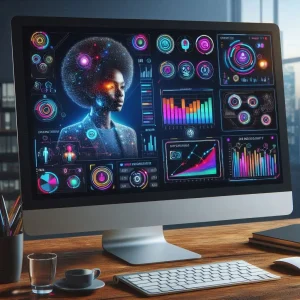In the rapidly evolving field of human resource management (HRM), artificial intelligence (AI) is transforming how organizations manage their workforce. AI-powered HRM web applications are particularly valuable for HR analytics, providing actionable insights that drive strategic decision-making. This blog post explores the essential AI features in HRM web applications that enhance HR analytics and improve overall efficiency.
1. Predictive Analytics
Predictive analytics utilizes historical data to forecast future trends. In HRM, this feature can predict employee turnover, performance outcomes, and recruitment needs. By analyzing patterns and identifying risk factors, HR professionals can proactively address issues before they become problematic.
- Turnover Prediction: AI models can analyze factors such as employee engagement scores, tenure, and job satisfaction to predict the likelihood of employees leaving. This enables HR to implement retention strategies effectively.
- Performance Forecasting: Predictive analytics can identify potential high performers and those who may need additional support, allowing for targeted development programs.
2. Automated Resume Screening
Automated resume screening leverages AI to streamline the recruitment process by quickly sifting through large volumes of applications and identifying the best candidates.
- Keyword Matching: AI algorithms match resume keywords with job descriptions, ensuring that only the most relevant resumes are shortlisted.
- Candidate Ranking: AI ranks candidates based on predefined criteria, such as skills, experience, and education, reducing bias and saving time for recruiters.
3. Sentiment Analysis
Sentiment analysis uses natural language processing (NLP) to interpret and categorize emotions expressed in written text, such as employee feedback, emails, and survey responses.
- Employee Feedback: By analyzing the tone and sentiment of employee comments, HR can gauge overall employee morale and identify areas needing attention.
- Culture Assessment: Sentiment analysis helps assess the company culture by understanding employee sentiments towards various initiatives and policies.
4. Workforce Planning
AI-driven workforce planning assists HR professionals in making informed decisions about staffing levels, skills development, and resource allocation.
- Demand Forecasting: AI models predict future staffing needs based on project timelines, market trends, and business growth.
- Skill Gap Analysis: Identifying skill gaps within the organization helps in planning targeted training and recruitment efforts.
5. Performance Management
AI-enhanced performance management systems provide real-time insights into employee performance, helping managers to make data-driven decisions.
- Real-time Feedback: AI tools enable continuous performance tracking and instant feedback, fostering a culture of continuous improvement.
- Objective Evaluation: AI minimizes biases in performance evaluations by relying on data-driven assessments.
6. Employee Engagement and Retention
AI tools for employee engagement help organizations understand and enhance employee satisfaction, leading to higher retention rates.
- Engagement Surveys: AI analyzes responses from employee engagement surveys to identify trends and areas of concern.
- Retention Strategies: By predicting which employees are at risk of leaving, AI enables HR to implement personalized retention strategies.
7. Learning and Development
AI-powered learning and development features customize training programs to meet individual employee needs and organizational goals.
- Personalized Learning Paths: AI recommends training courses based on employees’ roles, skills, and career aspirations.
- Effectiveness Measurement: Tracking the impact of training programs on employee performance and productivity.
8. Diversity and Inclusion
AI for diversity and inclusion ensures that hiring and promotion processes are fair and unbiased.
- Bias Detection: AI algorithms identify and mitigate biases in job descriptions, recruitment processes, and performance evaluations.
- Diversity Metrics: Tracking diversity metrics and providing insights to improve organizational inclusivity.
9. Chatbots and Virtual Assistants
AI chatbots and virtual assistants enhance HR service delivery by automating routine tasks and providing instant support to employees.
- 24/7 Support: Offering round-the-clock assistance for common HR queries such as leave balances, policy clarifications, and benefit information.
- Onboarding Assistance: Guiding new hires through the onboarding process, ensuring they have access to necessary resources and information.
Integrating AI features into HRM web applications significantly enhances HR analytics, providing deeper insights and enabling more strategic decision-making. From predictive analytics to personalized learning and diversity tracking, AI transforms how HR professionals manage their workforce. By leveraging these AI capabilities, organizations can improve efficiency, enhance employee satisfaction, and drive business success. Adopting an AI-powered HRM system is not just a trend but a strategic move to stay competitive in today’s dynamic business environment. Embrace the power of AI in HR analytics to unlock the full potential of your workforce.





